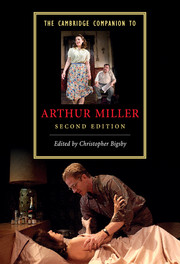Book contents
- Frontmatter
- 1 Introduction
- 2 The tradition of social drama
- 3 The early plays
- 4 All My Sons
- 5 Death of a Salesman and the poetics of Arthur Miller
- 6 Conscience and community in An Enemy of the People and The Crucible
- 7 A View from the Bridge
- 8 The Holocaust, the Depression, and McCarthyism
- 9 Miller’s 19s “power” plays
- 10 Miller in the eighties
- 11 The last plays
- 12 Arthur Miller and the cinema
- 13 Arthur Miller’s fiction
- 14 Critic, criticism, critics
- 15 Arthur Miller
- Index
- Cambridge Companions To ...
3 - The early plays
Published online by Cambridge University Press: 28 March 2011
- Frontmatter
- 1 Introduction
- 2 The tradition of social drama
- 3 The early plays
- 4 All My Sons
- 5 Death of a Salesman and the poetics of Arthur Miller
- 6 Conscience and community in An Enemy of the People and The Crucible
- 7 A View from the Bridge
- 8 The Holocaust, the Depression, and McCarthyism
- 9 Miller’s 19s “power” plays
- 10 Miller in the eighties
- 11 The last plays
- 12 Arthur Miller and the cinema
- 13 Arthur Miller’s fiction
- 14 Critic, criticism, critics
- 15 Arthur Miller
- Index
- Cambridge Companions To ...
Summary
If we think of Arthur Miller’s career as essentially beginning in 1944, with the disastrous Broadway production of The Man Who Had All the Luck, we ignore nearly a decade of playwriting, a decade in which he was shaping his ideas and experimenting with form. Writing as a student at the University of Michigan, he won two prestigious Hopwood Awards and was a runner-up with his third play. He wrote his first, No Villain, in 1936, and followed it with a series of plays in which he tested his skills and explored his response to private and public issues. Not all of them were by any means five-finger exercises. They Too Arise, a version of No Villain, was produced by both a local group and the Chicago division of the Federal Theatre. Even Honors at Dawn and The Great Disobedience, more obviously apprentice work, compare not unfavorably with the products of 1930s radical theatre whose own melodrama frequently matched that of the period. A further play, written in 1939–40, though lost for many years, did finally receive both a radio and a television production nearly fifty years later and was warmly received. The Golden Years, a play which takes place during the conquest of Mexico by Cortés, is a work of considerable subtlety and power which was written in response to the growing power of Hitler.
- Type
- Chapter
- Information
- The Cambridge Companion to Arthur Miller , pp. 24 - 50Publisher: Cambridge University PressPrint publication year: 2010

